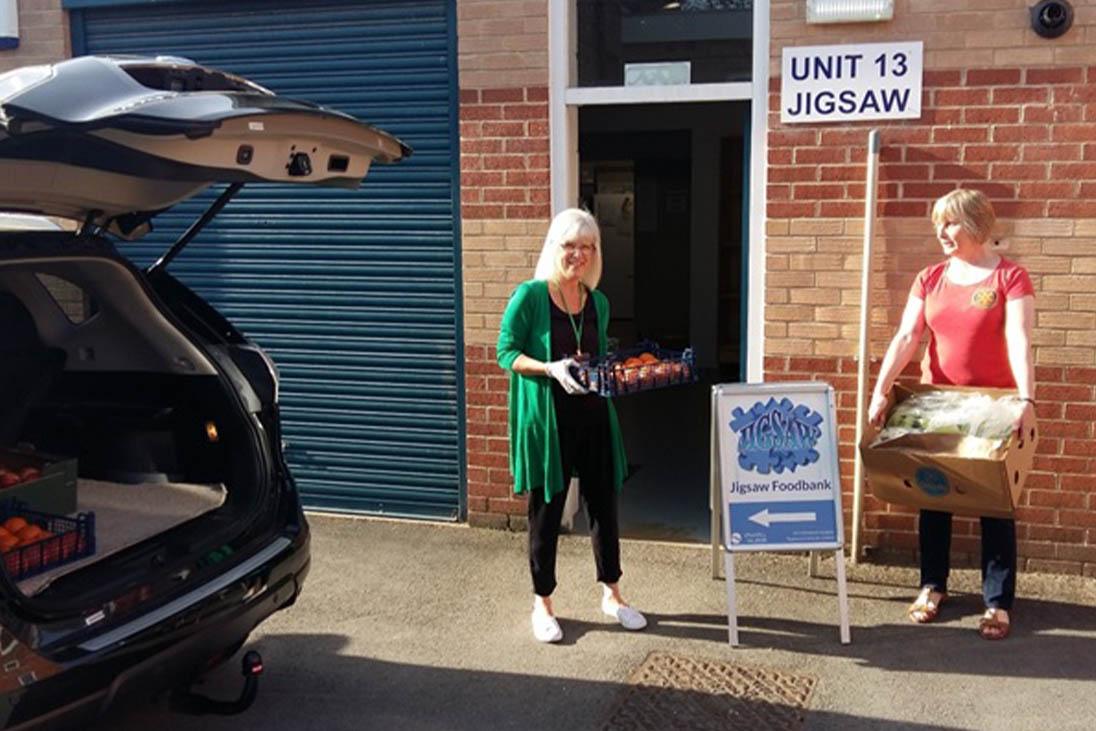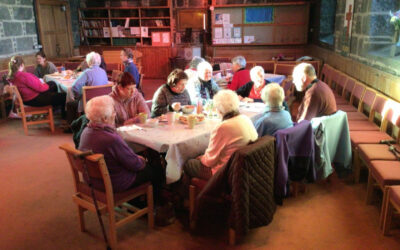Rotary clubs in East Midlands and South Yorkshire are piloting a new scheme to increase their commitment to foodbanks on a long-term basis.
The clubs in District 1220 are working on an initiative which is designed to provide food items to foodbanks as donations now and in the future.
It is hoped that the scheme will also enable foodbanks to purchase essential products which all foodbanks require regularly, at competitive prices.
The S6 foodbank in Sheffield has already benefited in this way.
With the help of Rotarians from other areas, the Rotarians from the East Midlands and South Yorkshire have already distributed tinned tomatoes and jam in volume, but this is only the start.


Rotarian Pam Fraser makes a Wirksworth Rotary food delivery to Jigsaw Foodbank manager Ruth Longfellow.
A central hub warehouse has been established in Mansfield and a satellite warehouse has been agreed to be established in Sheffield, with plans for Doncaster, Nottingham and Derby.
Funding sources, including the Rotary Foundation, that would generate £75,000 for the pilot area are currently being negotiated and a cloud funding platform will also be launched to provide long term funding.
Rotary4foodbanks co-ordinator, John Cavey, pointed out how Rotary has extensive supporter and volunteer connections and is a proven campaign organiser.
“We have been instrumental in eliminating the wild polio virus in all but two countries in the world and we want to help prevent a coronavirus food crisis in the UK,” he explained.
Rotary4foodbanks co-ordinator, John Cavey, pointed out how Rotary has extensive supporter and volunteer connections and is a proven campaign organiser.
John said that food banks are anticipating a minimum 30% increase in demand for emergency food as thousands of people lose their jobs or face reduced incomes, which means they cannot afford to eat.
This comes at a time when our foodbanks were already stretched to the limit. In 2019 they supplied 1,808,949 emergency food supplies, a 20% year-on-year increase.
“There are several notable short-term support initiatives but no visible long-term sustainable solutions,” added John.
food banks are anticipating a minimum 30% increase in demand for emergency food as thousands of people lose their jobs or face reduced incomes, which means they cannot afford to eat.”
“Rotary makes long-term, sustainable differences to lives all over the world.
“The current situation demands that we show what we can do in our own back yard. This scheme needs all the support Rotarians can offer.”
Many clubs in the District are helping with donations. Organisers want to turn that assistance into long-term sustainable support for foodbanks.
District Governor, David Hood, admitted it was early days, but he was encouraged by the progress being made.
Many clubs in the District are helping with donations. Organisers want to turn that assistance into long-term sustainable support for foodbanks.
He said: “The skills of our District team are being called on to make sure we deliver a scheme which helps to make sure that we do not have a food crisis here.
“The core relationship that the scheme is built on is that of an individual Rotary club and a nominated foodbank. If your club has a foodbank relationship or you are interested in developing one, please tell us.
“We are endeavouring to find ways of delivering the benefits of the scheme to individual clubs and Districts throughout Rotary in Great Britain & Ireland as quickly as possible.
“Knowing who the interested partner clubs and Districts are now would be extremely helpful.”
For more details, email programme co-ordinator, John Cavey at: [email protected]
Further north in County Durham, Houghton-le-Spring Rotary is directly responding to the coronavirus crisis by giving £250 each to the foodbanks at St Michael and All Angels, Houghton-le-Spring, and the Bournmoor, Fencehouses and Woodstone Village community support and foodbank.
Club President, Michael Gough, said: “We are very aware that many people are finding it increasingly hard to cope, with jobs and incomes being hit as a result of the lockdown.
“We are always happy to help in any way we can.
“As we are unable to meet regularly in person now, the club have been meeting on-line. As a result, we were able to easily authorise charitable donations such as these, as well as having the obvious benefit of keeping us all in touch.”
We are very aware that many people are finding it increasingly hard to cope, with jobs and incomes being hit as a result of the lockdown.”
As well as supporting 20 families with food parcels which they deliver, the Rotary club is trying to look after members of the community, especially the vulnerable and those who are socially-isolated, through group weekly meetings.
They are also supporting people through regular telephone conversations, and online as well. In addition, the Rotary club is acting as a signpost to the council.










